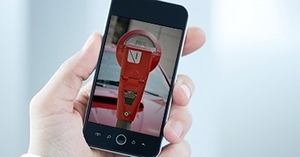Central Penn Business Journal - Digital Meter Feeder

Luck! You found parking close to your meeting downtown.
Cursed! The smartphone clock says you're running late and you can't find enough change to feed the parking meter.
Not a problem.
Carefully parallel park, open the Pango Mobile Parking app on your Droid or iPhone, digitally feed the meter, grab your briefcase and run. You might get a sideways glance from your boss for not being early, but you made the meeting on time because you didn't have to forgo the parking spot for lack of quarters.
Never heard of Pango Mobile Parking? You soon might hear more. The company with offices in Harrisburg and Baltimore has designed a smartphone app allowing users to pay for on-street or off-street parking without pulling sticky coins from beneath seat.
"What we're trying to do is provide a smart and convenient way for people to park and a smart and convenient way for cities to collect and manage parking," said Dani
Shavit, CEO of Pango Shyyny USA, also known as Pango Mobile Parking.
Pango — pronounced pay-n-go — is courting cities throughout Pennsylvania to use its parking app, and it landed a couple of big victories during the past eight months. On June 5, Latrobe in Westmoreland County launched its Pango pay-by-phone parking options. In November, former Gov. Ed Rendell signed on as an adviser to Pango to help the company reach new markets around the country.
Pango Mobile Parking was started in Israel in 2005, Shavit said. By 2009, the company had 25,000 new users per month for its pay-by-smartphone technology. Today, more than 700,000 people in Israel use Pango, and most cities have it as a parking payment option.
Fifty-five percent of parking receipts in Israel are collected using it, Shavit said. In Tel Aviv, Israel's second-largest city with more than 400,000 people, about 90 percent of parking receipts are collected using Pango.
Shavit is trying to bring that type of success to the U.S.
Latrobe signed up after city officials there saw the Rendell announcement, Latrobe City Manager Alex Graziani said.
"We are a very small operation, about a thousand spaces. Therefore, we do not have an IT department," he said. "Having them provide the service without us having to invest in equipment, software, et cetera, was a good way to go."
Adding Pango was a smart thing for Latrobe, he said, because it should help increase parking revenue from increased collections. The city also added Pango-only parking in places where parking previously was prohibited, without having to buy or install parking meters. The app is completely cloud-based and uses a smartphone's GPS to locate the right spot in a city's list of available spaces.
"There will be a day when meters will not be needed," Graziani said. "They will become like pay phones."
Pango's service takes a couple minutes to set up, but in cities where the option is available, users can add time to a parking spot and go about their day meeting with business clients or shopping. When time is running out, the Pango system sends a notification so the user can pay for more time on the spot or move the car.
Pango receives its revenue as a percentage of parking fees collected, as well as from advertising in the apps, Shavit said. Cities using Pango can also bring in downtown businesses to add coupons on the system for more exposure to the parking public.
While the user gets the parking convenience equivalent of checking Facebook, cities get a complete cloud-based management tool for their parking with detailed reports on tickets, revenues and usage times for city streets, Shavit said. Those metrics allow the municipality to change parking prices based on special events or times of day.
"That's a huge capability for the cities' parking operators," Shavit said.
The Lancaster Parking Authority has been looking at systems such as Pango's for a couple years now, Executive Director Larry Cohen said. Financially, it makes a lot of sense, because you can add metered parking without having to buy coin meters, he said. The systems are intriguing and will be a dominant force in future parking payments, but it might not be the right time for Lancaster, he said.
"We're not looking to be an early adopter of the technology, but we're tracking it," Cohen said.
Washington, D.C., and other large cities are running pilot programs using similar technology. Lancaster is watching those programs, as well as the technology evolution, to get a better understanding of how the city could use it and what problems might arise, he said.
For example, if a city were to convert completely to a pay-by-phone system, there would be issues of how best to serve motorists without smartphones, Cohen said. There's also a learning curve with any new technology, including the centralized parking kiosks used in many cities today.
However, cities with young tech-savvy populations usually have good success with technologies similar to Pango's, he said.
"You just have to look at your market and who you're serving," Cohen said. "Anything phone-related for the future is where it's at."
At a glance 
Pango Mobile Parking is a free, cloud-based app that uses a smartphone's GPS to locate the right spot in a city's list of available spaces. It is available in the Android Marketplace and iPhone app store.
So far, Latrobe in Westmoreland County is the only U.S. city that uses Pango as a parking payment option.
Overseas, however, the app is heavily used in Israel, where it accounts for 55 percent of parking receipts, according to Pango Shyyny USA CEO Dani Shavit. It's also used in France and Germany.






Comments
There are no comments yet for this item
Join the discussion